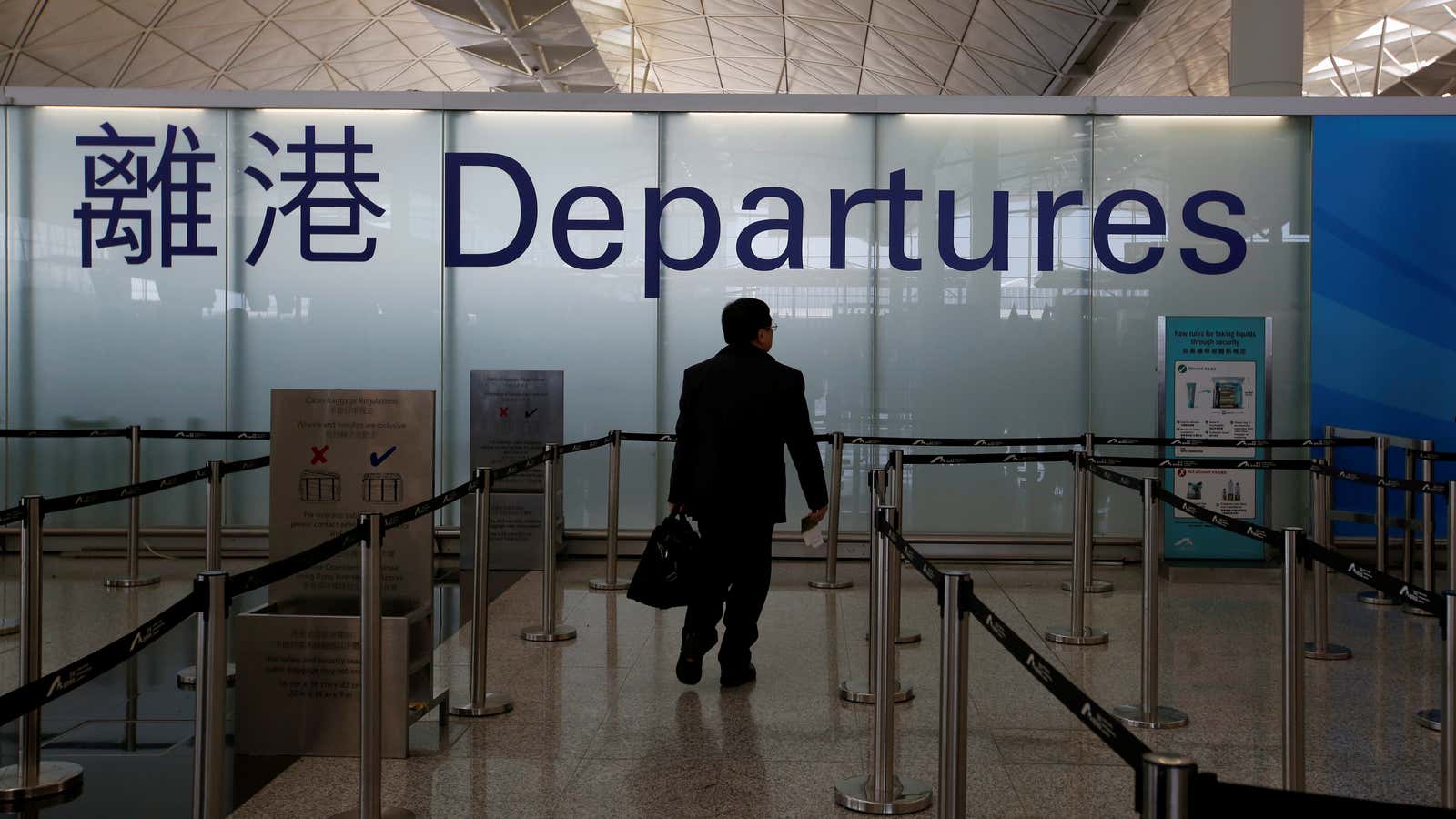In the months since a repressive national security law upended life in Hong Kong, numerous activists and politicians have fled the city for self-imposed exile abroad. Many more have emigrated, and as Britain’s new citizenship pathway for Hong Kongers takes effect at the end of this month, hundreds of thousands more could leave in the coming years.
Just today, local media reported that jailed activist Joshua Wong’s parents and brother have left the city for Australia.
But there are fears that Chinese authorities could try to make it more difficult for Hong Kongers to escape the crackdown, for example by adopting mainland Chinese-style exit bans particularly against activists and dissidents. For months, Beijing has made noises that the UK offer to Hong Kongers infringes its sovereign rights over its citizens.
Already, some of the over 10,000 people who have been arrested since protests started in June 2019 have had to surrender their travel documents. Those who previously would have resorted to fleeing for Taiwan by boat may now seriously reconsider that escape option, after 12 Hong Kong activists who did so were intercepted by mainland Chinese authorities, with 10 of them just sentenced to up to three years in prison by a Shenzhen court. And following the dramatic escape last month of a former lawmaker, who managed to retrieve his confiscated passport by presenting an official invitation from a Danish politician, bail conditions are certain to get tougher for arrests going forward.
Of particular concern is the fact that the new national security law grants police new powers to confiscate travel documents, explained local lawyers. Previously, merely being arrested did not warrant surrendering such documents; those arrested had to be brought before a judge, who would then grant bail on certain conditions that could include the confiscation of travel documents. Under the new security legislation, however, police are entitled to confiscate the travel documents of anyone suspected of endangering national security. For example, the dozens of activists arrested this month under the security law were ordered to surrender their passports, even though they were later released without charge.
Still, there are instances in which those arrested under the security legislation later have their passports returned. Yesterday, three teenage activists who were arrested last July on suspicion of subversion and secession were released unconditionally and had retrieved their travel documents. On Twitter, Hong Kong activists responded to the news by urging the teens to flee the city as soon as possible.
Against this backdrop, the Hong Kong government has proposed amendments to the city’s immigration laws. Ostensibly, authorities say the updates are necessary for streamlining the processing of asylum seekers’ non-refoulement claims, applications to prevent a person from being sent to another country where their fundamental rights are at risk of being violated.
But legal experts have pointed out several problems with the bill, which is in committee and must undergo a final round of reading before it’s voted on in a legislature that no longer has an opposition. First, a human rights lawyer argues the measures potentially harm asylum seekers with an excessively bureaucratic approach, and violate Hong Kong’s bill of rights. And second, critics say the amendments could be interpreted so widely as to impose de facto exit bans on anyone.
Exit bans are usually more associated with China’s opaque legal system than Hong Kong’s common law system, where due process, transparency, and independent courts and judges have long been embedded in the city’s DNA. Though China relaxed its entry and exit controls as part of its economic reforms starting in the late 1970s, authorities still regularly slap exit bans on activists and liberal intellectuals, even if they are not being prosecuted for a crime. Research by Thomas Kellogg and Zhao Sile of Georgetown University’s Center for Asian Law found at least 149 instances of exit bans being applied on Chinese citizens over the past 15 years.
One of the changes (pdf) to immigration law proposed by the Hong Kong government that has caused the most alarm is a provision that would empower the government’s immigration director, without obtaining a court order, to bar any individual from boarding a plane or ship.
Though the government has said the measures address asylum-related cases, “there is nothing that says it will only be applied to asylum seekers, or at the very least, non-Hong Kong residents,” said Hong Kong-based barrister Senia Ng. “Thus, with the very general and wide wording, it could have a real possibility of resulting in exit bans on anyone—including Hong Kong people, political dissidents.”
Another provision would authorize the immigration director to demand carriers provide authorities with detailed information about its passengers and crew.
In effect, this could pose “a real possibility of imposing barriers on persons seeking to flee political persecution in Hong Kong,” said Ng, because the government could “mandate the carriers to notify the government first before they board the carrier or even to stop them from leaving.” In fact, Ng added, the government could demand information not just on individuals, but an entire class of persons, such as British National Overseas passport holders. The BNO passport is a document issued to Hong Kong residents born before the 1997 handover, and it is holders of these documents who are the focus of the UK citizenship offer.
The government has cited the need to more efficiently clear a backlog (pdf) of non-refoulement claims as a key reason for putting forward the proposed amendments, and to “ensure earlier removal of unsuccessful claimants.” However, the number of pending claims has already decreased from over 10,000 in 2015 to just over 300 last year, according to government figures.
Moreover, if the government’s main aim with the changes is to remove unsuccessful claimants as soon as possible, “it’s a bit unusual for the government to restrict an asylum seeker from leaving the territory,” said Ng.
